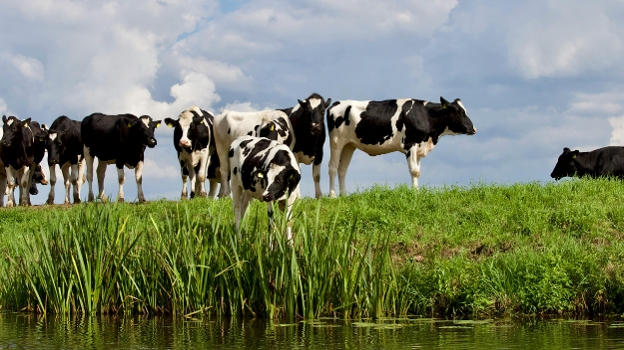Cookies
Van Hall Larenstein treats its customers' information with the utmost care and will never make this information available to third parties. Read more about us Privacy and Cookie Policy

The Climate Smart Dairy Value Chains (CSDVC) research group focuses on climate-smart dairy farming. For example a sustainable increase in productivity, the adaptation or mitigation of environmental impacts. And reducing greenhouse gas emissions such as nitrogen (ammonia) and carbon footprint (sum of carbon dioxide, methane and nitrogen oxides). The applied research group is researching how the technical and governance aspects of value chain partnerships can contribute to achieving these aims.

The CSDVC research group promotes the integration of education and practice by conducting relevant research and active engagement of students, teachers and business partners. It contributes to responsive, transparent, sustainable dairy farms and dairy chains and encourages dialogue with society.
This applies to all research lines: “in the Netherlands and to low and middle income countries”:
The first research line deals with technical aspects, while the second and third deal with human choices.
The CSDVC research group works at both national and international level on various projects concerning the themes of climate-resilient dairy farming, sustainable chain development and farm and capacity building.
Projects are categorised as follows:
|
| Netherlands | International (Africa) |
| Climate-resilient dairy farming | X | X |
| Sustainable chain development | X | X |
| Other (business acquisition) | X |
|
| Other (capacity building) |
| X |
List of projects

In collaboration with the Masters APCM and IDFC, the research group publishes around 4 to 6 assignments each year. These graduation projects are often directly linked to international projects by or through the research group. Internship and Bachelor graduation reports are more linked to Dutch projects. In addition, there are regular interviews with the lecturer around nitrogen issues as well as the discussion concerning methodology for measuring carbon footprint.
Key publications
All the research group’s publications are available on Greeni, the online library for the green universities of applied sciences.
Robert Baars graduated from Wageningen University in 1988 in Tropical Animal Husbandry, with specialisations in Tropical Animal Husbandry and Tropical Grassland. In 1996, he obtained his PhD with a thesis on the condition and management of rangelands in Zambia's Western Province. Over the past 30 years, he has gained international experience, working and living in Zambia, Costa Rica and Ethiopia for 13 years. He has been working at VHL since 2002, where he started as a lecturer, later becoming a programme coordinator and manager (2010), and eventually as associate lecturer and lecturer (2019).
In the Climate Smart Dairy Value Chains research group, Robert works on the acquisition and implementation of projects related to dairy farming, sustainable dairy chains, climate mitigation, climate adaptation, food losses and food waste. These projects tie in with education and cover topics such as CO2 equivalents, methane, nitrogen, ammonia, emissions and herb-rich grassland. Lecturer-researchers and project staff can contribute to vision and policy in education and practice through creative processes by, for example, business acquisitions and Living labs. The research group has so far produced 25 scientific publications.
The research group supports the Dutch government's ambitions in the areas of climate, nature and water, with a focus on the integrated approach to greenhouse gas and ammonia emission reduction. It also remains internationally oriented and strives to connect international and Dutch experiences.

The CSDVC research group is sponsored by Samenwerkingsverband Noord Nederland (SNN) and is part of the Education Programme of the Dairy Campus.
We join forces with these knowledge partners:
Most projects involve collaboration between HVHL and the other green universities of applied sciences: Aeres, HAS Green Academy and Inholland University of Applied Sciences.
At international level, we work together with universities from Ethiopia (Jima, Aksum), Kenya (Egerton, Meru) and Nigeria.
All projects involve SMEs or larger companies. The research group worked most closely with FrieslandCampina (mostly international context) and JOZ stable systems.
The CSDVC research group supports and inspires various VHL study programmes:
If you have any questions about the research group, please email or call lecturer Robert Baars:
Dr Robert Baars
Lecturer Climate Smart Dairy Value Chains
E-mail: [email protected]
Telephone: +31 (0)6 53128984